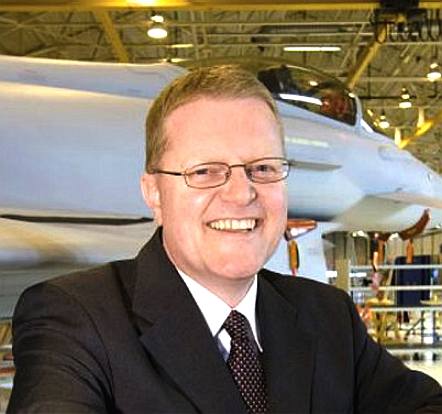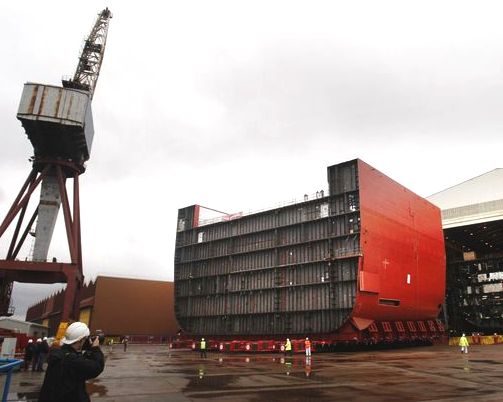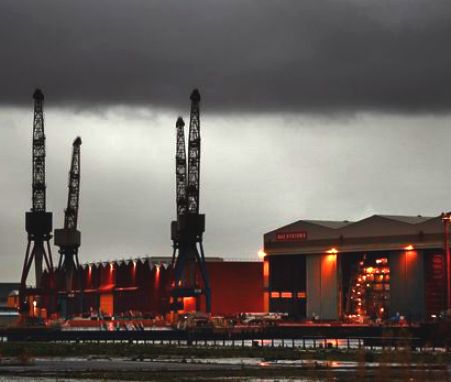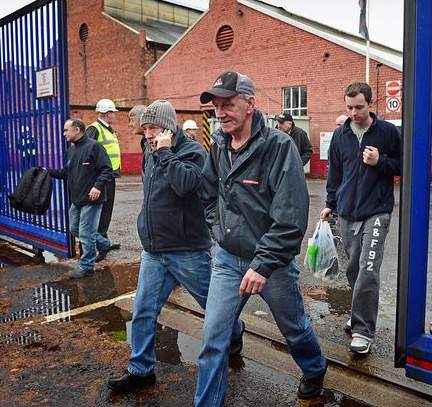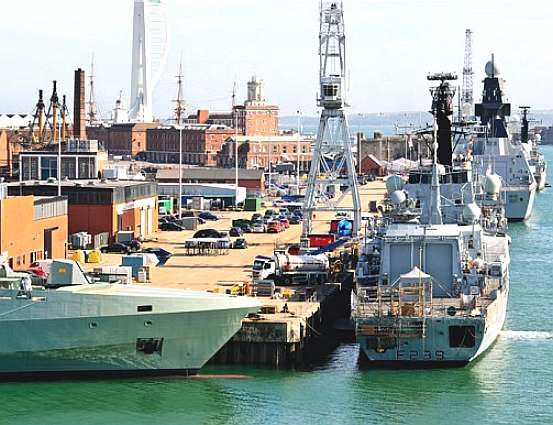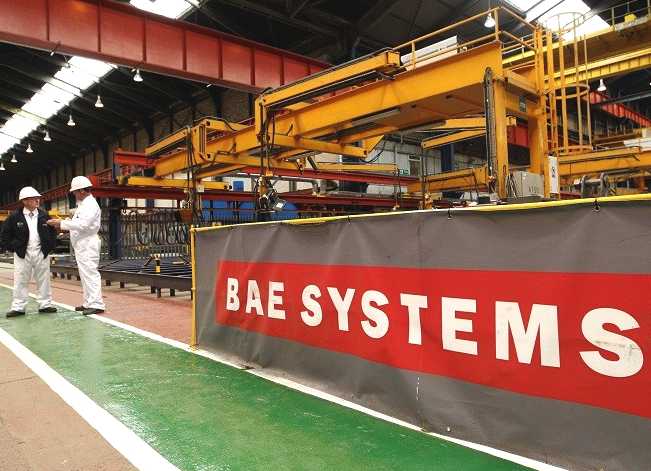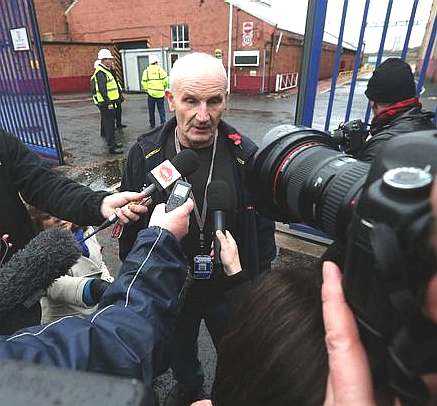|

NOVEMBER
7 2013
JOB
LOSSES
Defence giant BAE Systems is to axe 1,775 jobs across its naval ships business and end shipbuilding at one the country's most historic yards.
The firm said 940 jobs will be lost in Portsmouth, on the south coast, and a further 835 in Glasgow, Rosyth and Filton, near Bristol.
Shipbuilding operations will end in Portsmouth in the second half of next year, but an engineering team will be retained to support the new Type 26 warships, which will be built in Glasgow.
BAE said it remained committed to continued investment in Portsmouth as the centre of its maritime services and high-end naval equipment and combat systems businesses.
BAE said it was being hit by a "significant" reduction in workload following the peak of activity on the current
aircraft carrier programme.
"Following detailed discussions about how best to sustain the long-term capability to deliver complex warships, BAE Systems has agreed with the UK Ministry of Defence that Glasgow would be the most effective location for the manufacture of the future Type 26 ships," it said.
"Consequently, and subject to consultation with trade union representatives, the company proposes to consolidate its shipbuilding operations in Glasgow with investments in facilities to create a world-class capability, positioning it to deliver an affordable Type 26 programme for the
Royal
Navy.
"The cost of the restructuring will be borne by the Ministry of
Defence. The implementation of these restructuring activities will sustain BAE Systems' capability to deliver complex warships for the Royal Navy and secure the employment of thousands of highly skilled employees across the UK.
"In 2009, BAE Systems entered into a terms of business agreement (ToBA) with the Ministry of Defence that provided an overarching framework for significant naval shipbuilding efficiency improvements in exchange for commitments to fund rationalisation and
preservation of capability in the sector.
"The agreements announced today, together with an anticipated contract for the design and manufacture of the
Type 26 Global Combat Ships programme, will progressively replace that ToBA."
The news was given to workers at a series of meetings at 11am across the affected sites, before they were allowed to go home for the rest of the day.
Instead
of laying off the workforce, MOD contractors might think of developing
alternative military vessels for export. The future is set for expansion
in autonomy and energy efficiency. The technology exists today, it just
needs to be developed and field tested for another world beating
solution that British engineers are famous for.
QE
CLASS AIRCRAFT CARRIER
The decision will depend on future workload in the shipbuilding industry, with a gap in the British programme expected once the two
Queen Elizabeth class aircraft carriers are completed but before the Type 26 Global Combat Ship programme begins.
There is thus trickle employment for a reduced workforce.
Defence Secretary Philip Hammond admitted the city will suffer “a harsh blow” but said the Coalition hoped to announce measures to provide new jobs in Portsmouth. He said maintenance work on warships would sustain 11,000 jobs.
Stunned workers were told the news at mass meetings and allowed to go home. At Portsmouth a BAE boss read a nine-minute statement in a garage.
The GMB union’s David Hulse said: “This is a devastating day and the company will have to justify to us job losses planned.”
Experts say the knock-on effects could see 3,000 jobs go. As grim-faced staff left Portsmouth dockyard at 11.30am, worker James Jackson, 45, said: “The atmosphere was bitter. Management has behaved appallingly. Fathers and sons have worked here for generations.
WHITEHALL
Admiral Sir George Zambellas, First Sea Lord, said: "These new patrol vessels will build on the proven performance of the River Class by adding a flight deck to take the Navy's Merlin helicopters and by adding operational flexibility through extra storage capacity and accommodation. They are very welcome."
David Cameron said: “In Portsmouth, yes there will be job reductions, but there are many more people involved in ship servicing than in ship building, so the workforce will go from 12,000 to 11,000.”
In his response to the SNP’s Westminster leader Angus Robertson the PM added: “No one should be in any doubt of two things: under this Government we will have aircraft carriers, Type 45 destroyers, the new frigates, the hunter-killer submarines.
“And there’s something else they should know: if there was an independent
Scotland we wouldn’t have any warships at all.”
Defence Secretary
Philip Hammond will address MPs on the future of shipbuilding at 12.30pm, said Downing Street.
David Cameron's official spokesman told a regular Westminster media briefing: "These are decisions taken in the UK's national interest."
Asked whether any contingency plans had been made to preserve shipbuilding capacity in the rump UK in the case of Scotland voting for independence, the spokesman said: "The basis on which we proceed is on the basis that we are confident that the case (for Scotland to stay in the UK) will be successfully made."
The new was met with horror by local politicians. Tory MP Mark Hoban, whose Fareham constituency neighbours Portsmouth, said that the area would need Government support to deal with the blow.
"End of era for naval ship building on South Coast. Need Govt. help for area," he wrote on Twitter.
Steve Murphy, general secretary of construction workers union Ucatt, said: "Once again workers have found out that their jobs are under threat through the media. It is highly distressing and extremely unfair to treat a loyal workforce in such a way.
"This is a highly skilled workforce, so it is absolutely essential that the Government and
BAE Systems minimises job losses, guarantees the long-term future of all the shipyards and continues to invest in training the workers of the future."
At Prime Minister's Questions, David Cameron said: "These are extremely difficult decisions and our first thoughts should be with all of those that are affected."
"We want our Royal Navy to have the best and most modern ships and the best technology. That means we will go on building warships on the Clyde, we will be announcing three new offshore patrol vessels, keeping that yard busy rather than paying for it to remain idle as the last government proposed."
"In Portsmouth, yes there will be job reductions, but there are many more people involved in ship servicing than in ship building, so the workforce will go from 12,000 to 11,000."
CSEU
David
Hulse, GMB national officer and chair of the Confederation of Shipbuilding and Engineering Unions' (CSEU) shipbuilding national committee, said: "Following today's announcement from BAE Systems, we are able to confirm that no shipyard will be closing even though there are substantial job losses in the pipeline.
"There is no doubt that this is a devastating day for the UK shipbuilding industry and the company will have justify to us the job losses planned.
"We have arranged a two-day meeting with the company at Farnborough next Monday and Tuesday that will be attended by officers and shop stewards from all the yards and all the unions. This meeting will examine in detail the business case and all aspects for scheduling work in the yards to complete building the carriers, starting work on the Type 26 ships and any other work."
Hugh Scullion, general secretary of the CSEU, said: "The CSEU has been assured that further discussions will take place in the coming weeks with BAE over the future of its marine division, which has huge strategic importance for the UK's defence industry. Getting an agreement which avoids the need for compulsory redundancies will be central to our discussions with the company. The CSEU will also make it a priority to protect the future of the UK shipbuilding industry by securing investment to ensure the industry doesn't just survive but prospers in the future. "
BAE wound down its North East operations earlier this year, with the loss of around 300 jobs.
The defence manufacturer's regional presence now consists of a small specialist engineering team in
Newburn.
PORTSMOUTH
6 NOV 2013
Gerald Vernon-Jackson, leader of Portsmouth City Council, condemned the decision to shut down the last remaining shipyard in England with the capability to build advanced surface warships, saying it was bad news for the defence of the
UK and for the Royal Navy.
“The remaining yards with the capability to build advanced warships are in Scotland, and the referendum on Scottish independence is less than one year away. Ministers have put the defence of the UK and the future of the Navy at real risk,” he said.
The announcement was attacked as a politically motivated “act of lunacy” by one of Portsmouth’s Conservative councillors.
Portsmouth North MP Penny Mordaunt, who was recently appointed as a Commons aide to the Defence Secretary, provided no immediate comment. However, the Portsmouth Tory councillor Alistair Thompson condemned it as an "act of lunacy".
He said: "This is devastating for the workers and their families but also for all those people involved in the supply chain that keeps the dockyard working.
"It makes no sense to close England's most advanced ship-building facilities. It is an act of lunacy that could make us reliant on foreign shipyards for the supplying of the
Royal
Navy."
Alistair Thompson said: “This is devastating for the workers and their families but also for all those people involved in the supply chain that keeps the dockyard working.
“Many of those who I represent as a councillor are hugely concerned that this decision has been taken for political reasons because of the referendum in Scotland next year.”
Some politicians said Portsmouth was being hit harder than yards in Scotland because of the independence referendum next year.
It's
all too easy to become complacent. Size matters, but not when size
counts against you. Then, strategy and technology matter more. In lean
times we need lean solutions for economic, effective peacekeeping.
UNIONS
- CONFEDERATION of SHIPBUILDING and ENGINEERING
David Hulse, GMB national officer and chair of the Confederation of Shipbuilding and Engineering Unions'
(CSEU) shipbuilding national committee, said: "Following today's announcement from BAE Systems, we are able to confirm that no shipyard will be closing even though there are substantial job losses in the pipeline.
"There is no doubt that this is a devastating day for the UK shipbuilding industry and the company will have justify to us the job losses planned.
"We have arranged a two-day meeting with the company at Farnborough next Monday and Tuesday that will be attended by officers and shop stewards from all the yards and all the unions. This meeting will examine in detail the business case and all aspects for scheduling work in the yards to complete building the carriers, starting work on the Type 26 ships and any other work."
Hugh Scullion, general secretary of the CSEU, said: "The CSEU has been assured that further discussions will take place in the coming weeks with BAE over the future of its marine division, which has huge strategic importance for the UK's defence industry.
"Getting an agreement which avoids the need for compulsory redundancies will be central to our discussions with the company. The CSEU will also make it a priority to protect the future of the UK shipbuilding industry by securing investment to ensure the industry doesn't just survive but prospers in the future. "
Convener of the Confederation of Shipbuilding and Engineering Unions Jamie Webster speaks to the media as workers leave BAE Systems in Govan, Glasgow Convener of the Confederation of Shipbuilding and Engineering Unions Jamie Webster speaks to the media as workers leave BAE Systems in Govan, Glasgow
Shipbuilding operations will end in Portsmouth in the second half of next year, but an engineering team will be retained to support the new Type 26 warships, which will be built in Glasgow.
Unions said the job losses were a “devastating blow” to the industry, while some politicians said Portsmouth was being hit harder than yards in Scotland because of the independence referendum in Scotland next year.
Gerald Vernon-Jackson, leader of Portsmouth City Council, condemned the decision to shut down the last remaining shipyard in England with the capability to build advanced surface warships, saying it was bad news for the defence of the UK and for the Royal Navy.
“The remaining yards with the capability to build advanced warships are in Scotland, and the referendum on Scottish independence is less than one year away. Ministers have put the defence of the UK and the future of the Navy at real risk,” he said.
The announcement was attacked as a politically motivated “act of lunacy” by one of Portsmouth’s Conservative councillors.
Alistair Thompson said: “This is devastating for the workers and their families but also for all those people involved in the supply chain that keeps the dockyard working.
“Many of those who I represent as a councillor are hugely concerned that this decision has been taken for political reasons because of the referendum in Scotland next year.”
Defence Secretary Philip Hammond told the Commons that every effort would be made to redeploy workers, and that compulsory redundancies would be kept to a minimum.
“The loss of a shipmaking capability will be a harsh blow to Portsmouth,” said the minister, who announced that more than £100 million will be invested in the city’s naval base so it can accommodate new warships.
The minister also gave details of three new offshore patrol vessels for the Royal Navy, which will be built on the Clyde in Scotland.
The contract with BAE will provide work between the completion of the current aircraft carriers and the start of the building of Type 26 combat ships.
The minister said that following a review, the cost of the carriers was £6.2 billion, meaning the defence budget will remain “in balance”.
“The loss of such a significant number of jobs is of course regrettable, but it was always going to be inevitable as the workload on carrier build came to an end.”
BAE said it remained committed to continued investment in Portsmouth as the centre of its maritime services and high-end naval equipment and combat systems businesses.
BAE said it was being hit by a “significant” reduction in workload following the peak of activity on the aircraft carrier programme.
The grim news was given to workers at a series of meetings at 11am across the affected sites, before they were allowed to go home for the rest of the day.
David Hulse, GMB national officer and chairman of the Confederation of Shipbuilding and Engineering Unions’ (CSEU) shipbuilding national committee, said: “There is no doubt that this is a devastating day for the UK shipbuilding industry and the company will have justify to us the job losses planned.
“We have arranged a two-day meeting with the company at Farnborough next Monday and Tuesday that will be attended by officers and shop stewards from all the yards and all the unions. This meeting will examine in detail the business case and all aspects for scheduling work in the yards to complete building the carriers, starting work on the Type 26 ships and any other work.”
Steve Murphy, general secretary of construction workers union Ucatt, said: “Once again workers have found out that their jobs are under threat through the media. It is highly distressing and extremely unfair to treat a loyal workforce in such a way.”
Unite national officer for shipbuilding Ian Waddell said: “This is a very worrying time for the workforces and their families as the work on the two carriers comes to a conclusion.
“It is a huge blow to Britain’s manufacturing and industrial base, with many highly skilled workers faced with losing their jobs.”
NOVEMBER
7 2013 - ALL AT SEA 2 - Future Maritime Science and Technology Opportunities
Or
is that 'All At Sea Again?' Understandably,
when the subject of fully autonomous robot fleets came up, many of the BAE contingent
present at the 'All At Sea 2' event expressed the view that they were in the
business of building submarines and that a
robot fleet would effectively
put them out of business. But is that true, and is that what forward
planning is all about? Indeed, the cutbacks already in play should be an
indicator of the need to diversify and look to expand into growth
markets.
In
fact autonomous warfare, although the technology exists to become a
reality in the next few years, is a long way off. The clincher will be
when an opposing force takes the reigns, at which point the DSTL's
CDE
may ask why was nothing done sooner. Though BAE may be geared up to milk
the traditional fleet cows for another 10 years, all around them small
companies that are trying to break into the market, are developing
enabling technology, that the big players will probably seek to buy up,
or else become another Kodak, burying their heads in the sand to ignore the
digital image revolution.
DIVERSIFICATION
Ignoring
the robot side of the concept, which gets the hairs pricking up on their
necks, the enabling technology is useful for other purposes in manned
ships. Where pollution and energy efficient battleships are the
new buzzwords in Whitehall, can BAE afford to sit on the fence, or is
the current round of TSB
briefings enough of a wake up call for the diehards to be persuaded to
look at emerging technologies, rather than just playing lip service.
Even
in a support role, autonomous, or semi autonomous craft with reduced
crewing will make any fleet of submarines or other naval ships safer to
operate.
The
real problem may be that the size of such a contract is not sufficient
to keep a BAE workforce employed, which is another way of saying that
there is not enough profit in ZCC warships. Arms manufacturers want
large ships. The larger the better as big means big bucks.
Of the reduction in capacity deputy general secretary Garry Graham said: "For an island nation and in this time of increased global uncertainty, we should be seeking to maintain our shipbuilding capacity, not reduce it.
"Shipbuilding is not only a key element of our defence infrastructure, it is also an industry where the UK should be a world-leader, creating and sustaining highly skilled and well-paid jobs.
LINKS
& REFERENCE
http://www.theargus.co.uk/news/national/news/10788375.BAE_axes_1_775_jobs_at_shipyards/
http://www.theargus.co.uk/news/national/news/10798809.Portsmouth_protests_at_BAE_job_cuts/
http://www.express.co.uk/news/uk/441440/Shipbuilding-crisis-BAE-systems-to-axe-800-Scottish-jobs
http://www.aol.co.uk/video/bae-axes-1775-jobs-at-shipyards/518002608/ http://www.birminghammail.co.uk/news/uk-news/bae-systems-close-portsmouth-shipyard-6278052
http://www.ibtimes.co.uk/articles/519968/20131106/bae-jobs-losses-unions-shipyards-employment-labour.htm http://www.thejournal.co.uk/business/business-news/bae-systems-axe-1775-uk-6277145 http://www.lep.co.uk/news/business/anger-as-bae-axes-1-775-shipyard-jobs-1-6221937 http://www.huffingtonpost.co.uk/2013/11/06/bae-systems-axes-jobs_n_4224880.html http://www.mirror.co.uk/money/city-news/bae-systems-axe-1775-jobs-2682827 BAE-cuts-1775-jobs-at-Portsmouth-and-Scottish-shipyards
http://www.science.mod.uk/engagement/enterprise.aspx
http://www.science.mod.uk/Engagement/the_portal.aspx http://www.science.mod.uk/Engagement/enterprise.aspx https://www.dstl.gov.uk/centrefordefenceenterprise https://www.dstl.gov.uk

The
Bluefish™ platform in a modified form is suitable for adaptation to a
robotic battleship. The Wolverine
ZCC™ in its ultimate form may carry 4
x Tomahawks, 30 x SAMs, 2 x 12.75" and 2 x 21"
torpedoes + an
ROV or minisub. Not bad for a 50 ton battleship that needs no crew and
runs on clean energy from nature. A zoned network of these ships can
police international waters, attack and sink enemy aircraft carriers and submarines
in formation and shoot down aircraft that present a potential threat to
national security. The development of such ships represents an opportunity
for future exports and defence energy reductions.
|

